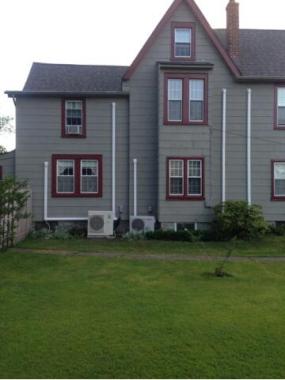Geothermal heat pumps (GHPs) may not be new to you, but they are not as common as air source heat pumps. Gaining familiarity with geothermal heat pumps—what they can and cannot do in this region—can help you decide if they are wise choice for your home, and if they will save you money on energy bills in the future.
Heat Pumps
Furnaces and boilers use combustion to release heat energy from fuels. Natural gas and oil are not the only sources of heat, however. Any mass has thermal energy—the total kinetic energy of all its particles—so air, water, and the ground itself has this thermal energy. Tapping this for heating our homes is tricky. You have to extract and transfer thermal energy affordably.
One solution is a heat pump. Heat pump installation and geothermal heat pumps transfer heat from the air, water or ground and bring it into your home. In summer, the process is reversed, and heat from indoor air is expelled outside.
Geothermal Heat Pumps
The word “geothermal” may give you visions of natural springs or rivers of lava. We have very few sources of magma in Pennsylvania, so geothermal heat pumps use closed water loops to transfer ground heat into the water, bring it up, concentrate it and pass it into your home’s air.
Water has a very high heat capacity—it holds a lot of thermal energy before you notice a rise in temperature. Air has a much lower heat capacity, meaning its temperature will rise more quickly than water when you add energy.
This is your clue that GHPs are far more energy efficient than air source heat pumps: You are loading water with the free ground heat, then transferring all that heat into your home’s air at very little cost. To extract heat from outside air, an air source heat pump must work more often, and harder, than a geothermal heat pump.
Pop Quiz
Which is larger, the mass of your Delaware Valley home or the Delaware Valley itself? Of course the thermal energy held in the ground is far greater than the thermal energy of your home, so even on the coldest days, the ground beneath you has ample heat to transfer into your home. This adds to the energy efficiency of geothermal heat pumps.
The seasons do not affect the usefulness of GHPs:
Energy-efficient geothermal heat pumps use loops (horizontal or vertical) to run water, or a water and antifreeze solution, through the the earth at a pleasant year-round temperature of approximately 54 degrees below the frost line. The Delaware Valley is a great spot to take advantage of the natural heating and cooling properties of the earth. Contact H&H Heating & Air Conditioning today to learn more.
Heat Pumps
Furnaces and boilers use combustion to release heat energy from fuels. Natural gas and oil are not the only sources of heat, however. Any mass has thermal energy—the total kinetic energy of all its particles—so air, water, and the ground itself has this thermal energy. Tapping this for heating our homes is tricky. You have to extract and transfer thermal energy affordably.
One solution is a heat pump. Heat pump installation and geothermal heat pumps transfer heat from the air, water or ground and bring it into your home. In summer, the process is reversed, and heat from indoor air is expelled outside.
Geothermal Heat Pumps
The word “geothermal” may give you visions of natural springs or rivers of lava. We have very few sources of magma in Pennsylvania, so geothermal heat pumps use closed water loops to transfer ground heat into the water, bring it up, concentrate it and pass it into your home’s air.
Water has a very high heat capacity—it holds a lot of thermal energy before you notice a rise in temperature. Air has a much lower heat capacity, meaning its temperature will rise more quickly than water when you add energy.
This is your clue that GHPs are far more energy efficient than air source heat pumps: You are loading water with the free ground heat, then transferring all that heat into your home’s air at very little cost. To extract heat from outside air, an air source heat pump must work more often, and harder, than a geothermal heat pump.
Pop Quiz
Which is larger, the mass of your Delaware Valley home or the Delaware Valley itself? Of course the thermal energy held in the ground is far greater than the thermal energy of your home, so even on the coldest days, the ground beneath you has ample heat to transfer into your home. This adds to the energy efficiency of geothermal heat pumps.
The seasons do not affect the usefulness of GHPs:
Energy-efficient geothermal heat pumps use loops (horizontal or vertical) to run water, or a water and antifreeze solution, through the the earth at a pleasant year-round temperature of approximately 54 degrees below the frost line. The Delaware Valley is a great spot to take advantage of the natural heating and cooling properties of the earth. Contact H&H Heating & Air Conditioning today to learn more.





